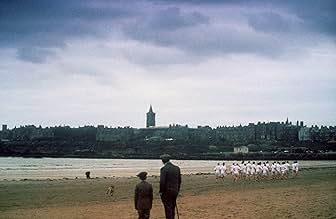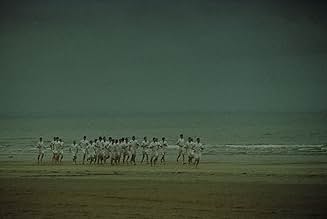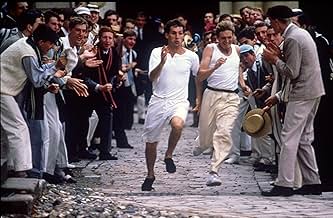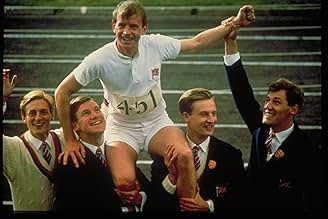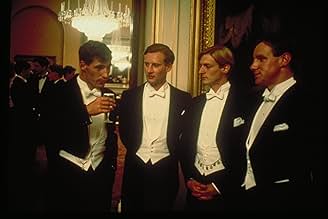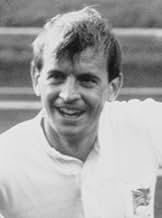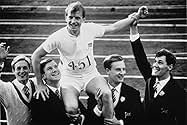Dos atletas británicos (uno judío y otro cristiano) compiten en las Olimpiadas de 1924.Dos atletas británicos (uno judío y otro cristiano) compiten en las Olimpiadas de 1924.Dos atletas británicos (uno judío y otro cristiano) compiten en las Olimpiadas de 1924.
- Dirección
- Guionista
- Elenco
- Ganó 4 premios Óscar
- 18 premios ganados y 19 nominaciones en total
John Gielgud
- Master of Trinity
- (as Sir John Gielgud)
- Dirección
- Guionista
- Todo el elenco y el equipo
- Producción, taquilla y más en IMDbPro
Opiniones destacadas
I was a student at Edinburgh University in 1981 and was actually lodging with one branch of Eric Liddell's family.
My friends and I all went to see this movie repeatedly -- and I mean five, six, or seven paid entrances. Why?
Personally, I don't think it had anything to do with the plot, character development, the music, or moral virtue. It was simply that the film was so utterly beautiful.
The men were beautiful in a clean, non-glamorous way that we had never seen before. Not in British films, and certainly not in Hollywood movies.
The social and educational expectations shared by all were beautiful. I know it is fashionable to decry the British class system, and in principle I agree with all the criticisms. But it also seems that erasing class-by-birth leaves little else but crass meritocracy and the sheer vulgarity of the uneducated masses. Abraham's fellow students at Cambridge and Liddell's at Edinburgh participated in a social and educational system not driven by concerns about jobs, and not pathetically challenged by students who saw themselves as consumers and professors as entertainers.
Britain was beautiful. Of course some parts still are, but Nazi bombs, post-war architecture, and modern cars have destroyed much. This was a Britain where people at the time might have decried "Victorian" architecture, but we in 1981 were just coming to realize how great it was. And this was a Britain where, for good or ill, middle class people kept their houses tasteful, and working-class door-steps were white-stoned each week.
In all this movie was a connection to the beautiful aspects of the British past. That past might never have existed in reality, but in 1981 we could just about touch it, above all in Edinburgh, spared by German bombs and still one of the most beautiful cities in the world.
My friends and I all went to see this movie repeatedly -- and I mean five, six, or seven paid entrances. Why?
Personally, I don't think it had anything to do with the plot, character development, the music, or moral virtue. It was simply that the film was so utterly beautiful.
The men were beautiful in a clean, non-glamorous way that we had never seen before. Not in British films, and certainly not in Hollywood movies.
The social and educational expectations shared by all were beautiful. I know it is fashionable to decry the British class system, and in principle I agree with all the criticisms. But it also seems that erasing class-by-birth leaves little else but crass meritocracy and the sheer vulgarity of the uneducated masses. Abraham's fellow students at Cambridge and Liddell's at Edinburgh participated in a social and educational system not driven by concerns about jobs, and not pathetically challenged by students who saw themselves as consumers and professors as entertainers.
Britain was beautiful. Of course some parts still are, but Nazi bombs, post-war architecture, and modern cars have destroyed much. This was a Britain where people at the time might have decried "Victorian" architecture, but we in 1981 were just coming to realize how great it was. And this was a Britain where, for good or ill, middle class people kept their houses tasteful, and working-class door-steps were white-stoned each week.
In all this movie was a connection to the beautiful aspects of the British past. That past might never have existed in reality, but in 1981 we could just about touch it, above all in Edinburgh, spared by German bombs and still one of the most beautiful cities in the world.
I beg to differ with several previous reviewers. This film is neither bland nor is it solely about professionalism vs. amateurism.
This film is about what drives people to do what they do. Eric Liddell (Ian Charleson) runs for the glory of God, whereas Harold Abrahams (Ben Cross) runs to prove his worth to a society that was anti-Semitic. Even though they run for different reasons, their drive and determination spur them on. They stand up for what they believe in and refuse to sacrifice their principles because it is the easy way out.
The supporting cast is also extraordinary, with Nigel Havers, Nicholas Farrell, Ian Holm and Sir John Gielgud all making important contributions to the final product.
There is absolutely nothing unnecessary in this film. The writing, the direction, the acting, the dialogue are all outstanding. And then there's that haunting score.
Once again, this is truly an outstanding film. One with universal themes that transcend time and place.
This film is about what drives people to do what they do. Eric Liddell (Ian Charleson) runs for the glory of God, whereas Harold Abrahams (Ben Cross) runs to prove his worth to a society that was anti-Semitic. Even though they run for different reasons, their drive and determination spur them on. They stand up for what they believe in and refuse to sacrifice their principles because it is the easy way out.
The supporting cast is also extraordinary, with Nigel Havers, Nicholas Farrell, Ian Holm and Sir John Gielgud all making important contributions to the final product.
There is absolutely nothing unnecessary in this film. The writing, the direction, the acting, the dialogue are all outstanding. And then there's that haunting score.
Once again, this is truly an outstanding film. One with universal themes that transcend time and place.
"Chariots of Fire" is a fine motion picture that won the Best Picture Oscar in 1981, even though it was the longest of long-shots. The film deals with two young Englishmen (Ben Cross and Ian Charleson) who have hopes of glory at the 1924 Olympics. We see that their struggles almost cost them the opportunity to achieve the greatness that they both desire. When they are both ultimately successful, Charleson feels that his win is due to God's glory and accepts the medal with the greatest of pride and admiration. However, after Cross wins the gold he feels somewhat disappointed and realizes that what he thought he wanted was not what he really wanted at all. The insight into this motion picture is amazing. Both athletes convey very common feelings that most people experience if they are serious enough in what they are doing, whether it be sports or something else. The main focus of "Chariots of Fire" is that the journey to get to the destination is more important and uplifting than the destination itself. Many question the fact that this film won the Best Picture Oscar over "Reds" and "Raiders of the Lost Ark". However, this is one time I cannot say anything negative about the Academy's decision. The fact that this film won in 1981 is testimony to the fact that the Academy is one of the greatest organizations in the world. Kudos to all involved here. 5 stars out of 5.
Perhaps the most moving of all movies that I have ever seen, Chariots of Fire is purely amazing. I must admit that when I first saw it back in '97, I was bored silly by it, but then again, all the movies that I was watching then were your typical fare for a young teen--Adam Sandler comedies (how asinine they are now). Now, I have a great respect for CoF, since I discovered the joy of running and the feel of the race. Before every cross country and track season, I force my teammates to sit down and watch this to help learn what teamwork means and the glory of striving your hardest. Oh and that soundtrack is also pretty good.
What an amazing movie it is... amazing is the word! I saw the movie today - on the 5th of Feb '09. What a pity that i couldn't experience the movie's aura earlier!
Chariots of Fire is an outstanding piece of work which may be easily, and deservedly so, termed as LEGENDARY! Watch this movie and you'll know what is inspiration and dedication...
The characterization is such exemplary that each and every character tell their own little story... The two main characters - Lindell and Abrahams - are such that you'll only want to know them better as you go on watching the movie... especially that of Lindell. The guy is so so dedicated and truthful that i for one would just feel honored to know him closely.
Guys, WATCH IT!!!!!!!!!!!!
Chariots of Fire is an outstanding piece of work which may be easily, and deservedly so, termed as LEGENDARY! Watch this movie and you'll know what is inspiration and dedication...
The characterization is such exemplary that each and every character tell their own little story... The two main characters - Lindell and Abrahams - are such that you'll only want to know them better as you go on watching the movie... especially that of Lindell. The guy is so so dedicated and truthful that i for one would just feel honored to know him closely.
Guys, WATCH IT!!!!!!!!!!!!
Oscars Best Picture Winners, Ranked
Oscars Best Picture Winners, Ranked
See the complete list of Oscars Best Picture winners, ranked by IMDb ratings.
¿Sabías que…?
- TriviaWhen Colin Welland completed his first draft, the only title he could come up with was "Runners". Then, one Sunday evening he turned on BBC's religious music series Songs of Praise (1961), featuring the hymn "Jerusalem," with lyrics from a poem by William Blake. The chorus included the words "Bring me my chariot of fire". The writer leaped to his feet and shouted to his wife, "I've got it, Pat! 'Chariots of Fire'!" (The "Jerusalem" hymn is featured at the beginning and end of the movie.)
- ErroresWhen signing an autograph for a young fan, Eric Liddell does not unscrew or remove any cap from the pen he uses. As all fountain pens have caps, he seems to be using a modern day ballpoint pen which was not invented until 1938.
- Citas
Eric Liddell: I believe God made me for a purpose - but He also made me fast. And when I run, I feel His pleasure.
- Versiones alternativasThere is at least one slightly different version of the movie, issued in Europe on homevideo. The beginning is different - shorter - and introduces Harold Abrahams while playing cricket with his colleagues. The scene in the train station, where Monty meets Harold is absent, as well as the loading of the baggage in the taxi they share. We simply see Monty writing a letter to his parents, mentioning that "Harold is as intense as ever" (cut to the cricket scene, maybe 30 seconds long), and then continues with "I remember our first day... we shared a taxi together" (cut to the two students unloading their stuff from the car). This alternate version also have slightly different end credits, and does not mention Harold marrying Sybil. The differences are minor (the U.S. version provides a more shocking memento of WWI, when it shows crippled baggage handlers in the station); one of the reasons the cricket scene was dropped in favour of the station one was due to the distributor's worry that the American market would not understand it.
- ConexionesFeatured in Vangelis: Chariots of Fire (1981)
- Bandas sonorasHe is an Englishman
(1878) (uncredited)
from "H.M.S. Pinafore"
Music by Arthur Sullivan
Lyrics by W.S. Gilbert
Selecciones populares
Inicia sesión para calificar y agrega a la lista de videos para obtener recomendaciones personalizadas
- How long is Chariots of Fire?Con tecnología de Alexa
Detalles
- Fecha de lanzamiento
- País de origen
- Idiomas
- También se conoce como
- Chariots of Fire
- Locaciones de filmación
- Productoras
- Ver más créditos de la compañía en IMDbPro
Taquilla
- Presupuesto
- USD 5,500,000 (estimado)
- Total en EE. UU. y Canadá
- USD 58,972,904
- Fin de semana de estreno en EE. UU. y Canadá
- USD 68,907
- 27 sep 1981
- Total a nivel mundial
- USD 59,317,376
- Tiempo de ejecución
- 2h 5min(125 min)
- Color
- Mezcla de sonido
- Relación de aspecto
- 1.85 : 1
Contribuir a esta página
Sugiere una edición o agrega el contenido que falta







